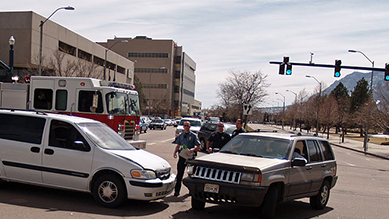THE ROLE OF PRIVATE PROPERTY IN A CAPITALIST MARKET ECONOMYSocially Constructed Property ClaimsThe concept of property is pervasive in our everyday lives in ways that extend well beyond the usual notion of ‘property as real estate.’ In many instances the ownership of property is fleeting or temporary and established as much by social convention as by any explicit rule or law. Below are several examples. A Seat in a ClassroomConsider a student sitting in a seat in a class. Once the student arrives at the class and takes a seat, it is socially accepted that she may occupy that particular seat until the end of class. Imagine the scene if another student approaches her and asks her to move so he can sit there. Will she immediately comply? Probably not. Instead she will likely act annoyed and suggest he find another seat. Of course, technically, she does not “own” the seat; the seat is owned by the school. The school in turn allows usage of the seats in a classroom to the students who are registered for the class during the time period of the class. If the seated student were not registered for this class, the second student might be able to petition the professor to ask her to relinquish her seat. Otherwise, the social convention is that seats are allocated to students on a first-come, first-serve basis. Thus, virtually everyone in the class, including the professor, would support the woman’s claim to temporary ownership of her seat. Once the class ends though, all students are also expected to relinquish their temporary ownership claims so they can be passed onto students in the next class. In this way, ‘ownership’ of the same seat passes from one person to another during the day. A Highway IntersectionNext consider the ‘ownership’ of the street in the middle of a busy intersection. Again, technically, the government owns the street. However, the government has constructed the roads so that the citizens can use them subject to a set of rules: the rules of the road. These rules establish property rights for use of the roads. When a car approaches an intersection (driving in the right lane if you are in the US), that car is given the right to enter and use the intersection while the traffic light is green. However, that right is fleeting, lasting only the few moments that it takes to cross the intersection. Once the traffic light turns red, the driver’s right to enter the intersection, and thus his right to that property has vanished. If he violates that rule of the road and is hit by an oncoming car, he will be at fault. In essence he has violated the other driver’s property right to the momentary use of the intersection. Calling ShotgunFor many families in the US, when several children are about to travel somewhere in the family car with only one parent, it is a special privilege to sit in the front passenger seat next to the driver. That seat is commonly referred to as the shotgun seat, or just “Shotgun!” Most families have an accepted procedure for claiming the shotgun position. In my family it simply required one of my children to shout out “shotgun” on the way to the car. First one to call it, claims the reward: in this case a property right to sit in the front seat for the duration of the trip. Restaurant TableImagine that just you and a friend are sitting at a table for four in a nice restaurant when another couple walks up and sits down in the two unoccupied chairs at your table. What would your reaction be? Would you just go on talking as if nothing had happened? Or, would you demand an explanation? Most everyone would do the latter. But wait a minute! By what right, really, do you have to object to this? As a restaurant customer you have no property right in the table; the table is formally owned by the restaurant owner. The owner himself may not even be in the restaurant at the time. So what would you do if the couple refused to leave? Most likely you would solicit help from a higher authority, which in this case is the restaurant hostess who seated you. You would demand that they force the couple to move and sit somewhere else. The cause for the objection here is an implicit property right violation. Social custom dictates that when a restaurant hostess seats you at a table, the table will be yours for the duration of the meal. In essence the restaurant has ceded the property right in the table to you temporarily and you expect that the right will not be violated. It is important to note that the right is only temporary though. If, for example, you remain seated at the table long after your meal is over and also long after you have stopped buying anything, the hostess herself might eventually come over and ask you to leave. Also, if you remain at the table until after the restaurant closes, eventually you will be forced to leave. Steven Suranovic, April 26, 2020 Sections |
INTERESTING ASIDES
Classroom Property
Property Rights Violation
Restaurant Rights
|

The Ethical Economics
Study Center


